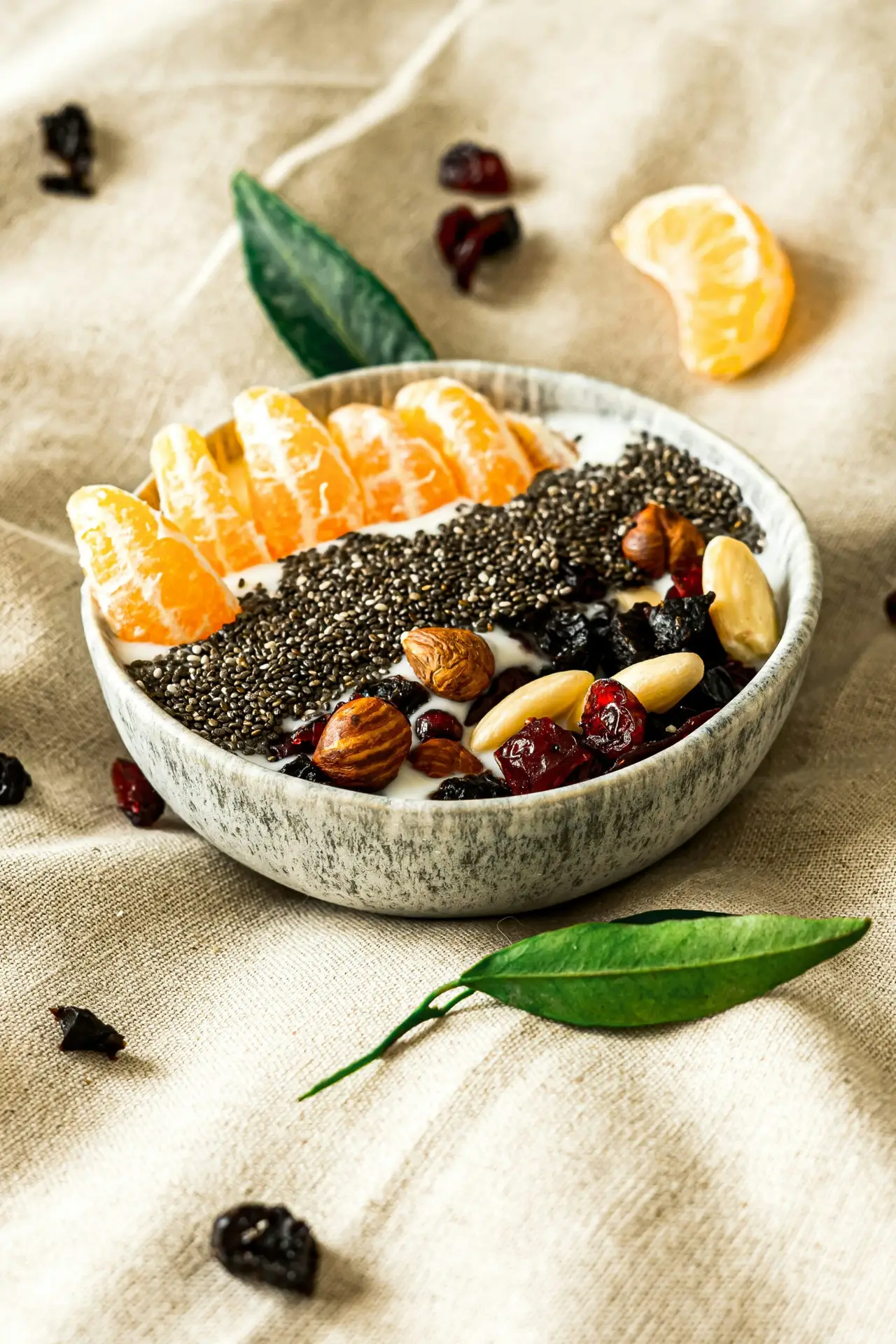Introduction to Chia Seeds
Chia seeds, small yet remarkably potent, have earned the esteemed title of ‘superfood’ due to their dense nutritional profile and myriad health benefits. Originating from the Salvia hispanica plant, which is native to Central America, chia seeds were a staple in the diets of ancient civilizations such as the Aztecs and Mayans. These ancient cultures valued chia seeds not only for their nutritional properties but also for their versatility in food preparation and as a source of sustainable energy.
The term ‘chia’ itself translates to ‘strength’ in the Mayan language, an apt description given the seeds’ impressive nutrient composition. Chia seeds are rich in omega-3 fatty acids, fiber, protein, vitamins, and minerals, making them a versatile addition to a health-conscious diet. Their ability to absorb large amounts of liquid and form a gel-like consistency has made them popular in modern culinary applications, ranging from smoothies to baked goods.
This blog post aims to delve into the various health benefits that chia seeds offer, including their impact on heart health, digestion, and energy levels. We will explore scientific research supporting these benefits and provide practical tips on how to seamlessly incorporate chia seeds into your daily nutrition plan. By the end of this article, readers will have a comprehensive understanding of why chia seeds are hailed as a superfood and how they can leverage these tiny seeds to bolster their overall health and well-being.
Nutritional Profile of Chia Seeds
Chia seeds have gained popularity not only as a versatile ingredient but as a powerhouse of nutrition. Renowned for their compact size, they offer an impressive array of macronutrients and micronutrients that contribute to their status as a superfood.
One of the most notable aspects of chia seeds is their high fiber content. A single ounce (approximately 28 grams) of chia seeds contains about 11 grams of dietary fiber, which is nearly half of the daily recommended intake for adults. This high fiber content supports digestive health and helps in maintaining regular bowel movements.
Chia seeds also serve as an excellent source of protein, with approximately 4 grams per ounce. This makes them a valuable plant-based protein option, particularly for vegetarians and vegans. Furthermore, they are rich in essential amino acids, the building blocks of protein, ensuring that the body receives a balanced profile of these crucial nutrients.
In terms of healthy fats, chia seeds are exceptionally rich in omega-3 fatty acids, primarily alpha-linolenic acid (ALA). Each ounce provides nearly 5 grams of omega-3s, which are essential for heart health, reducing inflammation, and supporting cognitive function.
The micronutrient profile of chia seeds is equally impressive. They are particularly rich in calcium, offering about 18% of the recommended daily intake per ounce. This makes chia seeds a great alternative source of calcium for those who are lactose intolerant or do not consume dairy products. Magnesium, another vital mineral, is present at 30% of the daily value per ounce, playing a key role in muscle and nerve function, as well as maintaining bone health.
Chia seeds also provide a significant amount of antioxidants, including quercetin and chlorogenic acid. These antioxidants help to fight free radicals in the body, thereby reducing the risk of chronic diseases and promoting healthy aging.
Overall, the density and diversity of nutrients in chia seeds make them an excellent addition to any diet, providing numerous health benefits with each serving.
Digestive Health Benefits
Chia seeds are hailed for their remarkable role in promoting digestive health, primarily due to their significant fiber content. These tiny seeds are packed with soluble and insoluble fibers, which together facilitate smooth digestion. Soluble fiber dissolves in water to form a gel-like substance, aiding in the easy passage of food through the digestive tract. The insoluble fiber, on the other hand, adds bulk to the stool, helping to ensure regular bowel movements and prevent constipation.
A well-functioning digestive system is vital for overall health, and chia seeds contribute significantly to this aspect. The high fiber content in chia seeds can assist in maintaining a balanced gut microbiome. This environment supports the growth of good bacteria essential for effective digestion and nutrient absorption. Studies have shown that a high-fiber diet is associated with a lower risk of digestive disorders such as irritable bowel syndrome (IBS) and diverticulosis.
Scientific research supports these digestive health benefits. For example, a study published in the “Journal of Food Science and Technology” found that the dietary fiber in chia seeds positively impacted digestion and gut health. Another study in the “Clinical Nutrition” journal highlighted that incorporating chia seeds into a daily diet could significantly improve bowel regularity and reduce the symptoms of constipation.
Integrating chia seeds into one’s diet is seamless and versatile. They can be added to smoothies, yogurt, cereals, and salads, or used as a thickening agent in soups and stews. For a nutritious boost, chia seeds can also be incorporated into baking recipes, providing an easy way to enhance dietary fiber intake. With just a few tablespoons a day, chia seeds can be a simple yet effective strategy to promote digestive health and overall well-being.
Cardiovascular Health Advantages
Chia seeds have garnered considerable attention for their significant role in promoting cardiovascular health. One of the primary components that contribute to this benefit is the high concentration of omega-3 fatty acids. These essential fatty acids are known for their ability to reduce cholesterol levels, particularly low-density lipoprotein (LDL) cholesterol, which is often referred to as “bad cholesterol”. Elevated LDL levels are a significant risk factor for the development of heart diseases.
Research has demonstrated that the alpha-linolenic acid (ALA) present in chia seeds can also help in managing blood pressure. Studies published in the American Journal of Clinical Nutrition revealed that a diet inclusive of chia seeds led to a noticeable reduction in both systolic and diastolic blood pressure in individuals with hypertension. This hypotensive effect is attributed to the anti-inflammatory properties of omega-3 fatty acids, which reduce the inflammation of blood vessels, thus enhancing blood flow and lowering pressure.
Moreover, chia seeds are rich in antioxidants and dietary fiber, both of which contribute to heart health. Antioxidants combat oxidative stress, which is a key factor in the deterioration of cardiovascular health. On the other hand, the soluble fiber in chia seeds can help to lower cholesterol by binding to cholesterol molecules and promoting their excretion from the body. A study conducted by the Cleveland Clinic demonstrated that higher fiber intake is linked to lower risks of heart disease.
For those looking to integrate chia seeds into their diet for cardiovascular benefits, one practical approach is to incorporate them into daily meals. Adding a tablespoon of chia seeds to smoothies, yogurts, oatmeal, or salads not only enhances the nutrient profile of these foods but also ensures a consistent intake of omega-3 fatty acids and fiber. By making chia seeds a regular part of a balanced diet, individuals can significantly improve their cardiovascular health and reduce the risk of heart-related ailments.
Role in Weight Management
Chia seeds have garnered significant attention for their potential role in weight management. Rich in both dietary fiber and protein, chia seeds can be instrumental in promoting a sense of fullness, which is crucial in regulating overall calorie intake. A single serving of chia seeds, approximately 28 grams or around two tablespoons, contains an impressive 10 grams of fiber. This high fiber content can help slow digestion, stabilize blood sugar levels, and reduce cravings, contributing to a feeling of satiety and aiding in weight control.
Protein, another critical component in chia seeds, further supports weight management by enhancing the sensation of fullness. Protein-rich diets have been linked to reduced calorie consumption and better weight loss outcomes. Chia seeds provide nearly 5 grams of protein per serving, making them a valuable addition to a balanced diet aiming for weight loss or maintenance.
Scientific studies have substantiated the role of chia seeds in aiding weight loss. Research indicates that when chia seeds are consumed, they can absorb up to 27 times their weight in water, forming a gel-like substance in the stomach. This gel not only adds volume without additional calories but also prolongs the absorption of nutrients, thereby maintaining satiety for longer durations.
Incorporating chia seeds into one’s diet is both simple and versatile. They can be added to smoothies, yogurt, or oatmeal for breakfast, sprinkled on salads and soups for an extra nutritional boost, or used in baking recipes to replace some of the fats and serve as a thickening agent. When mixed with water or other liquids, chia seeds can also be made into a refreshing pudding, further enhancing their hydrating properties and potential benefits for weight management.
By integrating chia seeds into daily meals, individuals can leverage their fiber and protein content to promote fullness, control calorie intake, and ultimately support their weight management goals.
Blood Sugar Regulation
Chia seeds have garnered attention for their potential role in blood sugar regulation, making them a noteworthy addition for those managing diabetes or seeking to prevent it. The high fiber content in chia seeds plays a pivotal role in these benefits. By slowing the rate at which food is converted into glucose, dietary fiber can help in preventing rapid spikes in blood sugar levels. This gradual release of glucose into the bloodstream supports a steadier energy supply and minimizes sudden drops in glucose levels that can trigger cravings or energy crashes.
In addition to fiber, the protein content in chia seeds further aids in stabilizing blood sugar levels. Protein takes longer to break down than simple carbohydrates, contributing to a more sustained release of energy. This dual function of chia seeds, through both their fiber and protein, underscores their potential as a natural method for managing blood sugar levels over the long term.
Scientific research supports these claims. Several studies have indicated that chia seeds can improve markers of metabolic health, including blood sugar levels. For instance, a study published in the European Journal of Clinical Nutrition found that chia seed supplementation significantly reduced postprandial blood glucose levels and insulin resistance in individuals with type 2 diabetes.
Incorporating chia seeds into the diet of diabetics or those at risk of developing diabetes can be practical and straightforward. These seeds can be added to a range of meals, providing versatility alongside their health benefits. Sprinkling chia seeds over yogurt, oatmeal, or salads, blending them into smoothies, or incorporating them into baked goods are all easy ways to integrate them into daily meals. Moreover, chia seed pudding, which involves soaking the seeds in liquid overnight, offers a nutrient-dense breakfast option that also helps in blood sugar management.
Overall, chia seeds offer a simple yet effective approach to blood sugar regulation, promoting better metabolic health through their unique nutritional profile.
Antioxidant and Anti-inflammatory Properties
Chia seeds are celebrated for their impressive antioxidant and anti-inflammatory properties, which play a critical role in mitigating oxidative stress and inflammation within the body. Oxidative stress results from an imbalance between free radicals and antioxidants in your body. Chia seeds, rich in polyphenols and flavonoids, are powerful antioxidants that help neutralize these free radicals, thereby reducing oxidative stress.
The significance of antioxidants in chia seeds extends to the prevention of chronic diseases. Studies have highlighted the correlation between oxidative stress and the development of conditions such as cancer and arthritis. Antioxidants in chia seeds, such as quercetin and kaempferol, have been found to inhibit the proliferation of cancer cells and induce apoptosis, or programmed cell death, in malignant cells. These antioxidants also exhibit anti-inflammatory effects by downregulating pro-inflammatory biomarkers, which can contribute to the amelioration of inflammatory conditions such as arthritis.
Furthermore, research has demonstrated that the consumption of chia seeds can lead to a decrease in inflammatory markers. For instance, a study published in the Journal of Clinical Medicine evidenced that participants consuming chia seeds experienced a reduction in C-reactive protein (CRP), a key indicator of inflammation. The anti-inflammatory properties of chia seeds are critical in managing and preventing chronic inflammatory diseases, thereby promoting long-term health.
Incorporating chia seeds into your daily diet is a practical way to harness these health benefits. Chia seeds are versatile and can be easily added to a variety of meals. Sprinkle them over yogurt, blend them into smoothies, or mix them into oatmeal or salads. They can also be used as an egg substitute in baking, making them an excellent addition to a plant-based diet. By integrating chia seeds into your daily nutrition, you can leverage their antioxidant and anti-inflammatory properties to support overall wellbeing and mitigate the risks of chronic diseases.
Practical Ways to Incorporate Chia Seeds into Your Diet
Chia seeds are lauded for their nutritional benefits and remarkable versatility, making them an excellent addition to various dishes. Integrating chia seeds into your daily diet is not only simple but also highly rewarding. Here are some practical and delicious ways to enjoy this superfood.
1. Smoothies: One of the easiest ways to include chia seeds in your diet is by adding them to smoothies. Simply toss a tablespoon of chia seeds into your blender along with your favorite fruits, vegetables, and a liquid base like almond milk or yogurt. This not only boosts your smoothie with fiber and omega-3 fatty acids, but also adds a pleasant thickness when the seeds absorb the liquid.
2. Chia Pudding: A popular and delicious option is chia pudding. Mix three tablespoons of chia seeds with one cup of milk or a plant-based alternative, sweeten with a bit of honey or maple syrup, and add a dash of vanilla extract. Let this mixture sit in the refrigerator for at least two hours, or overnight, to allow the seeds to swell and create a pudding-like consistency. Top with fruits, nuts, or granola before serving.
3. Salads: Chia seeds make an excellent garnish for salads. Sprinkle them directly over your greens, or mix them into your salad dressing. They add a subtle crunch and blend seamlessly with various flavors and textures. A simple vinaigrette with olive oil, lemon juice, and chia seeds can transform your salad into a nutritional powerhouse.
4. Baked Goods: For those who enjoy baking, chia seeds can be incorporated into bread, muffins, or cookies. Replace a part of your flour with ground chia seeds for an extra boost of nutrients, or use whole seeds for added texture. They are especially beneficial in gluten-free recipes by helping to bind the ingredients together.
Preparation Methods: When using chia seeds, it’s important to note that soaking them in liquid before consumption helps improve digestibility and nutrient availability. A general guideline is to mix one part chia seeds with six parts liquid. While chia seeds can be eaten raw, soaking them ensures you get the maximum health benefits.
Recommended Daily Intake: Moderation is key when adding chia seeds to your diet. A typical recommended daily intake is about two tablespoons, providing a good balance of nutrients without overloading your system.
By incorporating these techniques, you can easily and creatively integrate chia seeds into your meals, thus tapping into their numerous health benefits and significantly enhancing your dietary intake.
2 responses to “Unlocking the Health Benefits of Chia Seeds : A Superfood Spotlight”
-
Yo, has anyone tried onbets23? I’m always looking for new places to put down some bets. Hit me up if you’ve got any insights! I’m gonna check it out now: onbets23
-
98usdtopkr, hmm. Never heard of it before. Looks interesting. Maybe I’ll drop a little something in and see what happens. Fingers crossed! Give it a look see: 98usdtopkr.





Leave a Reply